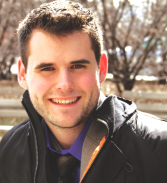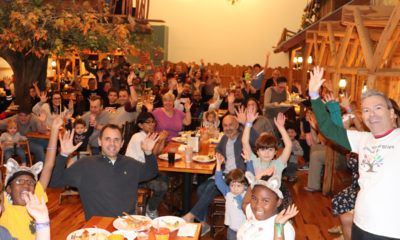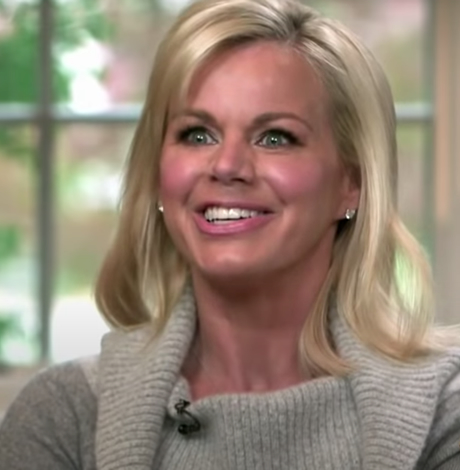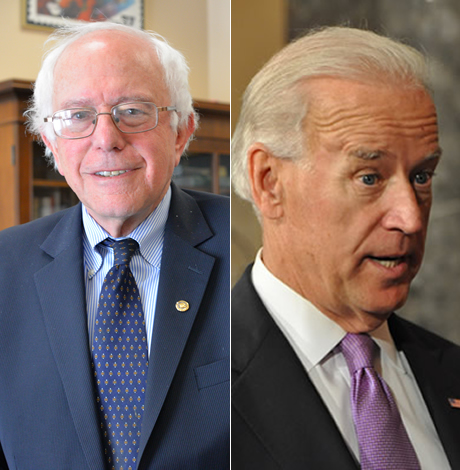Arts & Entertainment
‘That kid from YouTube’
Young Iowan releases a book about growing up with his ‘Two Moms’
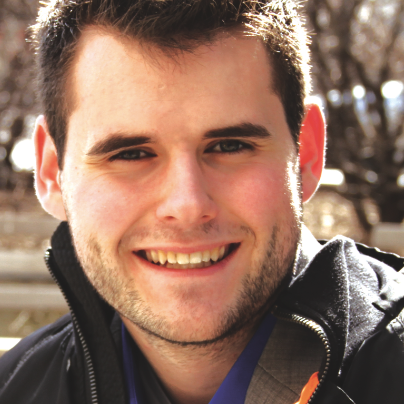
You know him as “That kid from YouTube,” but the now 20-year-old loving son of two moms, Zach Wahls hopes he will soon be “That kid from the New York Times Best Seller” list.
“We’re all keeping our fingers crossed — it would be great to be a New York Times best selling author before I can legally have a drink to celebrate that fact,” says former Eagle Scout Wahls about his two-week-old memoir “My Two Moms,” which has been in or near the Amazon top 100 best sellers all week.
A major boost for Wahl’s book came last week with his April 30 appearance on “The Daily Show with Jon Stewart,” on Comedy Central, which caused his book about being raised with Iowa values by a committed lesbian couple to jump up the Amazon’s 22nd spot.
Before he was on the “Daily Show” or Ellen DeGeneres, Wahls was a viral video sensation. Not because he did a weird impression or blew something up, but because he gave an incredible, moving testimony before the Iowa House Judiciary Committee, which was considering sending to Iowans a Constitutional amendment that would undo a state Supreme Court decision to extend marriage rights to same-sex couples.
In his testimony, Wahls discussed his excellent grades and outstanding athletic achievements, opening his own business, studying engineering at the University of Iowa and his time in the Scouts where his mother Terry, whom he calls “short mom,” was a den mother, while “tall mom” Jackie helped out with the Cub Scouts.
“If I was your son, Mr. Chairman, I believe I would make you very proud,” Wahls says in one memorable moment of the video.
But this all-American boy — who says he can’t drink, but does enjoy a cigar every once in a while, and would like to celebrate the success of his book with one if he makes the Times list — is now turning his 15 minutes of fame into a career of advocacy.
His book chronicles the struggles his family faced over the years — such as mother Terry’s struggle with M.S. — and the values that kept them together.
On the phone from Asheville, N.C., on Monday, the day before the vote on Amendment One, he has a lot to say.
WASHINGTON BLADE: The book is organized in an unusual way. Why?
ZACH WAHLS: The book has 14 chapters and two appendices. The first chapter is “Be Prepared,” which is the Boy Scouts’ motto, and the last chapter is “Do a Good Turn Daily,” which is the Scouts’ slogan. And the middle 12 chapters are named and oriented after and on a tenant of the scout law. And the scout law is a scout is trustworthy, loyal, helpful, friendly, courteous, kind, obedient, cheerful, thrifty, brave, clean and reverent.
Each chapter is an examination of that value, and how I learned it from my moms first, and how I learned it from the Boy Scouts, what it means to me, and what it means to the LGBT community in general.
BLADE: What was the “Daily Show” experience like?
WAHLS: It was the seven coolest minutes of my life.
And Jon, actually — unlike the host of literally every single other show — actually came to the green room backstage before the show and we had a nice little conversation. It was very clear that he had read the book, it was clear that he enjoyed the book and we just had a great little conversation.
I was standing in the green room, and what he does is that he starts talking very loudly as he’s walking toward you down the hall, so you can hear him coming, and he knows that you can hear him coming.
He’s just such a classy guy. Just 100 percent pure class.
I went to the rally to restore sanity last year, and it was the first time I’d ever ridden a Greyhound, actually. Like 24 hours on a Greyhound from Iowa to D.C. to the rally, and I’ve been watching the show since I was like 10. It was an amazing moment.
My moms and my sister were there, they had a great time too. It was great for sure.
BLADE: You seemed very confident and calm. Were you nervous?
WAHLS: Well he came backstage before, and that helped a lot. I was like almost about to have a nervous breakdown when he actually walked into the room. So that would have been what I was experiencing when I walked on stage had he not done that. So that was useful.
It was definitely a high stakes seven minutes. We managed to have a conversation and have a great time, and it was a blast.
But they told me before I went on, don’t make any jokes, and I kept trying not to.
BLADE: But you did! You did make a joke, and it landed well, the audience laughed!
WAHLS: I was having so much fun, I couldn’t help myself.
BLADE: What is the key to changing minds on the issue of rights for LGBT people?
WAHLS: The single most important task is continuing to systematically dismantle this myth of choice.
I think that’s why the YouTube video was so successful. I mean I never come out in the video and say I’m straight — and I’m hesitant to come to conclusions, because that’s something we shouldn’t do — but I think it is fairly clear in the video that I am a flaming straight man. So I think that the single most important development in any person’s movement on the continuum of opposition to LGBT rights to support for LGBT rights is the understanding that sexual orientation is not a choice. It is a pervasive misconception, and in many cases a pervasive lie that unfortunately many Americans do believe to be true.
But when you see people move beyond that misconception, it becomes very difficult for them to believe subsequently that homosexuality is immoral. Because if it’s not a choice, how could it be immoral? It’s much like historically saying someone is immoral or less than simply because of the color of their skin or the organs between their legs.
It used to be the belief that women were subservient to men and that blacks where inferior to whites, and that’s why — when it came to women’s suffrage or civil rights in the sixties — you had to address the underlying discrimination and the underlying beliefs before you could have the political solution that guaranteed equal rights, and that’s what we’re seeing here as well.
BLADE: One problem the LGBT movement often has with allies is commitment. Polling shows most Americans are with the LGBT activists on the big issues like employment, housing, benefits and even equal marriage is polling over 50 percent nationwide, but that doesn’t mean that supporters bother to leave the house to go vote for our rights in a special election like North Carolina’s. How do we inspire more allies to action?
WAHLS: To be clear, I don’t consider myself an ally. I might be straight cisgender man, but in my mind, I am a member of the LGBT community.
I know the last thing that anyone wants is to add another letter to the acronym, but we need to make sure as a movement we’re making a place for what we call “queer-spawn” to function and to be part of the community.
Because even though I’m not gay, I do know what its like to be hated for who I am. And I do know what its like to be in the closet, and like every other member of the LGBT community, I did not have a choice in this. I was born into this movement. I want to be explicitly clear first of all.
These fights affect me, they affect my family.
Now my best friend Nick, a straight guy, he’s an ally.
In terms of how we can have an upgraded commitment from straight allies, the fact is that if you look at the straight community, generally, there is a lot of excitement. And its not just support but excitement on this issue, because I think — in liberal politics generally — this is one of the few issues across the country in which we are not just standing our ground, but actually advancing as a progressive community.
Gay people can’t win this alone though. There aren’t enough people in the LGBT community itself to win this on their own. So in terms of what strategies are most effective? I think that making sure that you are illustrating these personal connections and engaging in this relationship building. Obviously, I come from a somewhat biased point of view, but if you have a close family member or a close friend who is openly LGBT, not only are you more likely to support the issue, but you’re more likely to act as well.
BLADE: There are lots of heartfelt YouTube videos out there with people explaining why LGBT rights matter. Why did yours blow up so big?
WAHLS: I know, its kind of crazy! Well, I think there are two factors. First is that it disrupted some expectations. When you think of whatever that stereotype of two women raising a kid is, a clean cut engineering student, Eagle Scout, entrepreneur — from Iowa to boot — probably isn’t that stereotype. And I think people enjoy seeing those stereotypes getting broken down.
I think more importantly and fundamentally, in that video, I hope you really do see me display my love for and commitment to my family. And I think it reminded a lot of people of their own love and their own commitment that they feel for their families. And I think that was really what struck home. The confidence, the passion, and at the end of the day, the love that was driving through.
BLADE: After three years of equal marriage, what are attitudes like across Iowa today on the issue of same-sex marriage?
WAHLS: Actually, The Onion had a great article, when marriage became legal, and the headline was “Hell opens up and swallows Davenport Iowa.” Obviously it was satire. The sky didn’t fall. Divorce rates are falling, straight people are still marrying straight people. They aren’t catching the gay. 92 percent of Iowans feel that they have not been affected by the Supreme Court ruling in any major way and 56 percent of Iowans oppose a Constitutional amendment to reverse the Supreme Court decision [that extended marriage rights to same-sex couples in Iowa].
It’s important to note that there is still a small disconnect between those who support same-sex marriage and those who would oppose its repeal. I think that this speaks to the Iowan ethos, which is the notion of “live and let live.” Even though they may not necessarily support same-sex marriage, they aren’t willing to take it away from couples like my parents.
BLADE: Until your video went viral on YouTube, yours was pretty much a quiet, average all-American family. How have your mothers handled all of the extra attention?
WAHLS: My moms have handled it really about as well as you can expect mothers to handle this kind of thing. It was definitely hard at some points for them. They see, obviously a lot of potential when you’re in the limelight to come under very sharp criticism and that happened.
There was a conservative radio host in Iowa who spent 20 minutes of his show going through my speech line by line by line accusing me of all kinds of rhetorical black magic. He seems to think I’m some kind of mastermind or something, which is quite flattering. But my moms hear that, and their protective instincts kick in, definitely.
They’ve been overwhelmingly proud, no doubt about it, but their primary concern is my safety. But they know I’m a grown man, I can handle myself — more often than not — so they’re mostly proud.
Although I do spend a lot less time at home, so I don’t see them or my sister nearly as frequently as I used to. And we’re all a little disappointed about that. My sister and I were both looking forward to the Avengers movie together for a long time, and she caved and saw it with “short mom,” which I was a little upset about. But I understand. I guess. [laughs]
Unlike her, I’m willing to wait til I get home to see it.

Friday, April 18
“Center Aging Friday Tea Time” will be at 2 p.m. on Zoom. This is a social hour for older LGBTQ+ adults. Guests are encouraged to bring a beverage of choice. For more details, email [email protected].
Go Gay DC will host “LGBTQ+ Community Social in the City” at 7 p.m. at Hotel Zena. This event is ideal for making new friends, professional networking, idea-sharing, and community building. This event is free and more details are available on Eventbrite.
Trans and Genderqueer Game Night will be at 6 p.m. at the DC Center for the LGBT Community. This will be a relaxing, laid-back evening of games and fun. All are welcome and there’ll be card and board games on hand. Feel free to bring your own games to share. For more details, visit the DC Center’s website.
Saturday, April 19
Go Gay DC will host “LGBTQ+ Community Brunch” at 11 a.m. at Freddie’s Beach Bar & Restaurant. This fun weekly event brings the DMV area LGBTQ+ community, including Allies, together for delicious food and conversation. Attendance is free and more details are available on Eventbrite.
LGBTQ People of Color Support Group will be at 7 p.m. on Zoom. This peer support group is an outlet for LGBTQ People of Color to come together and talk about anything affecting them in a space that strives to be safe and judgement free. There are all sorts of activities like watching movies, poetry events, storytelling, and just hanging out with others. For more information and events for LGBTQ People of Color, visit thedccenter.org/poc or facebook.com/centerpoc.
“Spark Sapphic Social” will be at 8 p.m. at Spark Social House. This weekly sapphic social is an opportunity to mix and mingle with other sapphics in D.C.’s newest LGBTQ bar. This event is free and more details are available on Eventbrite.
“DC Drag Brunch on Rooftop – Penthouse (Formerly at Lima Twist)” will be at 12 p.m. at Baby Shank Rooftop. Hosted by Miss Capital Pride, this is the ultimate drag brunch experience in Washington, D.C., featuring the fiercest queens around. Prepare to be entertained by glamorous drag queens and celebrated celebrity impersonators, including Taylor Swift, Lady Gaga, Beyoncé, Britney Spears, Nicki Minaj, Ariana Grande, Whitney Houston, Cher and many more. Tickets cost $27 and are available on Eventbrite.
Sunday, April 20
Queer Crayon Club will host “Queer Sketch Social” at 3 p.m. at Sinners and Saints. This is a fun event for LGBTQ+ adults to come together and color. Attendance is free and more details are available on Eventbrite.
Monday, April 21
“Center Aging Monday Coffee & Conversation” will be at 10 a.m. on Zoom. This is a social hour for older LGBTQ+ adults. Guests are encouraged to bring a beverage of choice. For more details, email [email protected].
Tuesday, April 22
Genderqueer DC will be at 7 p.m. on Zoom. This support group is for people who identify outside of the gender binary. Whether you’re bigender, agender, genderfluid, or just know that you’re not 100% cis – this is your group. For more details, visit www.genderqueerdc.org or Facebook.
Coming Out Discussion Group will be at 7 p.m. on Zoom. This is a peer-facilitated discussion group and a safe space to share experiences about coming out and discuss topics as it relates to doing so. For more details, visit the group’s Facebook.
Wednesday, April 23
Job Club will be at 6 p.m. on Zoom. This is a weekly job support program to help job entrants and seekers, including the long-term unemployed, improve self-confidence, motivation, resilience and productivity for effective job searches and networking — allowing participants to move away from being merely “applicants” toward being “candidates.” For more information, email [email protected] or visit thedccenter.org/careers.
Asexual and Aromantic Discussion Group will be at 7 p.m. on Zoom. This is a space where people who are questioning this aspect of their identity or those who identify as asexual and/or aromantic can come together, share stories and experiences, and discuss various topics. For more details, email [email protected].
Thursday, April 24
Virtual Yoga with Sarah M. will be at 7 p.m. on Zoom. This is a free weekly class focusing on yoga, breath work, and meditation. For more details, visit the DC Center for the LGBT Community’s website.
DC Anti-Violence Project Open Meeting will be at 7 p.m. on Zoom. This meeting is open to anyone interested in learning more and getting involved in lessening violence both within and directed towards the LGBT communities. For more information, visit Facebook or Twitter.
Movies
Heartfelt ‘Wedding Banquet’ remake a romcom worth seeing
Mishaps, crossed wires, conflicts are all part of the fun
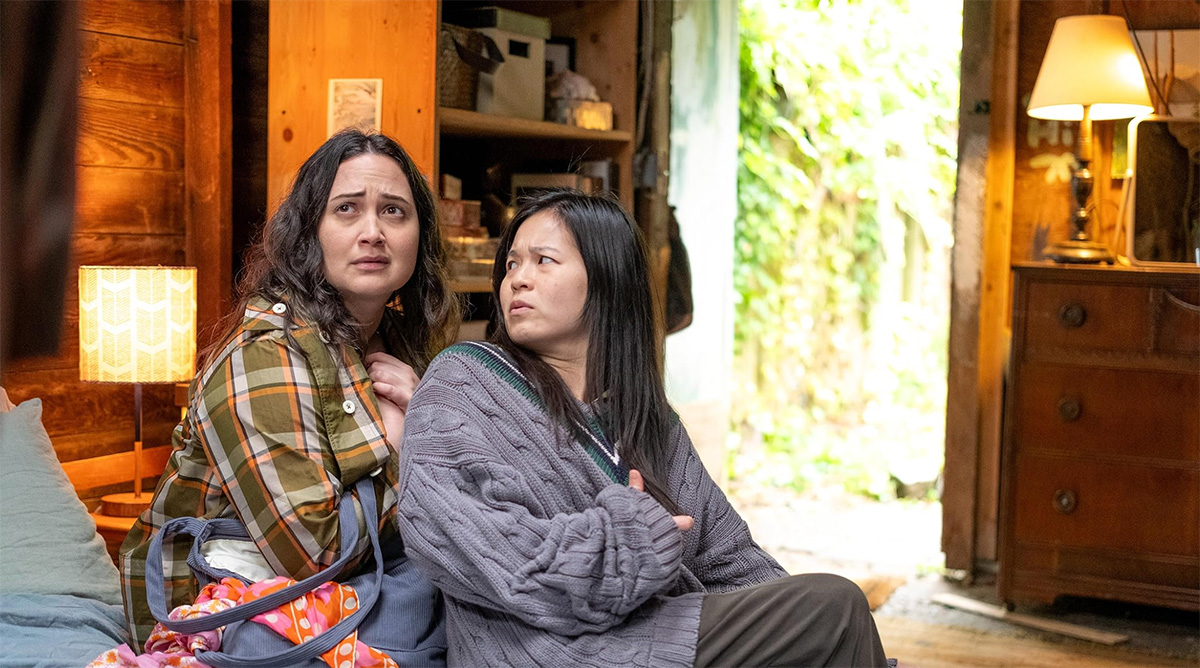
Creating a worthy remake can be a tricky proposition, especially when the movie being remade is a beloved classic – but that doesn’t mean it’s an impossible one.
Consider Andrew Ahn’s new version of 1993’s “The Wedding Banquet,” a film that put future “Brokeback Mountain” director Ang Lee on the proverbial map in America, which opens in theaters this weekend after a debut at Sundance earlier this year. The original, an American/Taiwanese production which became a surprise hit in the U.S., broke ground with its story — a culture-clash comedy of manners about a queer romantic triangle attempting to stage a sham wedding, it was quickly embraced by LGBTQ audiences thrilled to see representation on the big screen and positive representation, at that, in an era when it was even scarcer than it is today. To undertake a remake of such a film is a bold move, to say the least.
Yet gay Korean American writer/director Ahn (“Spa Night,” “Fire Island”) – has built his blossoming career on films about queer relationships among Asian American characters, with as much (or more) emphasis on family, both biological and chosen, as on romantic partnership; It seems natural, perhaps, for him to reinterpret this influential classic through his own lens, and he’s already proven himself as a filmmaker whose strengths line up perfectly with the material.
Even so, Ahn hedges his bets, perhaps, by collaborating on the new screenplay with James Schamus, who also co-wrote the original (along with Lee and Neil Peng), and the result is a movie that – although it recrafts the original romcom for a newer age and reconfigures its central relationships a bit to “up the ante” on its complications – stays relatively faithful to the broad strokes of its plot.
In this iteration, the New York setting is transposed to Seattle, and the plot revolves around not just one queer romance, but two: Chris and Min (Bowen Yang and Han Gi-Chan), a stalled grad student and his South Korean boyfriend, and their lesbian friends-and-landladies Lee and Angela (Lily Gladstone and Kelly Marie Tran), who are struggling to become parents through expensive IVF treatments. Min, an artist whose temporary visa is about to expire, wants to stay with Chris and build a life in America, but his grandmother (Youn Yuh-jung) – currently running the vast family business empire to which he is heir – wants him to come home and claim his place in the organization. A wedding to Chris would secure him the green card he needs to defy his grandmother’s demands, but it would also mean outing himself as gay and potentially being cut off from his inheritance. As a solution, he offers to pay for Lee and Angela’s fertilization procedure in exchange for a “green card wedding” with the latter, ensuring that he can remain in the U.S. while also remaining in the closet to his family.
Of course it’s an idea as bad as it sounds, but despite some reticence, the couples agree to the plan; but when grandmother decides to come to America and meet the bride in person, the four of them must attempt to pull off a masquerade that escalates far beyond their expectations after she insists on putting on a traditional – and elaborate – Korean wedding worthy of her grandson’s exalted status, all while wrestling with the ambivalence and doubts that begin to encroach on their relationships as the scheme begins to fray at the edges.
Those who’ve seen the original already know that things don’t play out exactly as planned – and anyone who hasn’t won’t be surprised when it doesn’t, anyway. We already told you it was a bad idea.
That, of course, is the charm of the romcom, a genre in which mishaps, crossed wires and conflicts are all part of the fun, and in any case it gives Ahn’s film the opportunity to explore – as Lee did with the original – the more serious and relatable challenges of reconciling our queerness with the deeply ingrained traditions of our cultural background; he does so with gentle wit and an equal measure of respect, but he’s not above getting laughs by pointing up the sheer absurdity that sometimes goes along with the process. Neither does he hesitate to delve into the messiness of queer relationships, even (and perhaps especially) with lifelong friends, or the deep insecurities and self-criticisms which get in the way of sorting them out.
To these ends, “Wedding Banquet” relies heavily on its cast, who embrace and clearly relish the chance to flesh out these characters. Yang brings his inevitable “SNL” star power to the table but downplays the wackiness in favor of a more nuanced tone, and Gi-Chan shines as his pragmatically idealistic partner; Gladstone’s intelligence and authenticity is a grounding force, while Tran counterpoints her with an eminently likable turn as her spunky-but-anxious misfit of a girlfriend – and the resonance they each bring to the prospect of motherhood highlights the longing for family and legacy that so many queer couples carry as they build their lives together.
It’s not all about the couples, though. Veteran Chinese American actress Joan Chen (“Tai Pan,” “Twin Peaks”) is a scene stealer as Angela’s hyper-supportive mom, whose participation in her daughter’s “lavender wedding” requires her to go against her deepest instincts as a proud ally, and Bobo Le provides a further connection to the theme of family with a charming performance as Yang’s tomboy-ish little sister. The anchoring performance, however, comes from acclaimed Korean star Yuh-jong, whose shrewd, savvy, and staunch portrayal of Gi-Chan’s power player grandma adds a much-needed dose of level-headed wisdom into the midst of the whirlwind.
In the end, Ahn’s update of Lee’s classic comedy scores big points for honoring the original’s message of acceptance and embracing the notion of reimagining our ideas of traditional family structures to meet the needs of an ever-changing world; it also succeeds in maintaining a heartfelt sense of empathy for each of its characters, all of whom appeal to us precisely because of their imperfections and their hangups. None of them are perfect, but all of them are perfectly human, which goes a long way toward making Ahn’s remake feel like more than just the slickly-made feel-good romcom it resembles.
And yet, given the screwball potential and the endless possibilities for farcical developments in the convoluted deception attempted by its sets of lovers, Ahn’s “Wedding Banquet” could have been funnier. Leaning into an idealized and sentimental perspective as it gracefully brings its characters’ lives into place, it occasionally feels a bit “precious,” too “Hollywood” to be believed.
Again, however, this is part of the charm of the romcom: if generations of straight audiences have gotten the chance to buy into idealized big screen fantasies about life and love, then why shouldn’t we enjoy the same privilege?
With that in mind, “The Wedding Banquet” makes for a perfect opportunity to entertain and validate ourselves – and even if it doesn’t tickle your funny bone, it’s a generous enough feast for your queer soul that it deserves you to see it.
Just make sure you bring somebody special to share your popcorn with.
a&e features
Peppermint thrives in the spotlight
In exclusive interview, she talks Netflix show — and the need to resist Trump’s attacks

As an entertainer, there’s not much that Peppermint hasn’t done. She’s a singer, actor, songwriter, reality TV personality, drag queen, podcaster and the list goes on. Most importantly, as an activist she has been an invaluable role model for the trans, queer, and Black communities.
She’s a trailblazer who boasts an impressive list of ‘firsts.’ She is the first out trans contestant to be cast on “RuPaul’s Drag Race” (Season 9). She is the first trans woman to originate a principal musical role for Broadway’s “Head Over Heels.” She was also the first trans woman to compete in the runaway hit series “Traitors,” on Peacock, and she is the ACLU’s first-ever Artist Ambassador for Trans Justice. Her accolades are a true testament of the courage it took for Peppermint to live her authentic self.
We caught up with Peppermint to chat about her activism, taking on bigger roles on screen, our current political and social climate and life beyond the lens. For Peppermint, coming out as trans was not just a moment of strength—it was a necessity.
“It unfolded exactly as I had imagined it in terms of just feeling good and secure about who I am. I was in so much pain and sort of misery and anguish because I wasn’t able to live as free as I wanted to and that I knew that other people do when they just wake up. They get dressed, they walk out the door and they live their lives. Being able to live as your authentic self without fear of being persecuted by other people or by the government is essential to being healthy,” Peppermint tells the Blade in an exclusive interview.
“I was not able to imagine any other life. I remember saying to myself, ‘If I can’t imagine a life where I’m out and free and feeling secure and confident and left alone, then I don’t even want to imagine any kind of a life in the future,’” says Peppermint.
Recently, Peppermint returned for season 2 of Netflix’s comedy “Survival of the Thickest.” She added some spice and kick to the first season in her role as a drag bar owner. This time around, her character moves center stage, as her engagement and wedding become a major plot line in the show. Her expanded role and high-profile trans representation come at just the right time.
“It’s the largest acting role I’ve ever had in a television show, which my acting degree thanks me. It feels right on time, in a day where they’re rolling back trans rights and wanting to reduce DEI and make sure that we are limited from encouraging companies, corporations, industries, and institutions from not only featuring us, but supporting us, or even talking about us, or even referencing us.
“It feels great to have something that we can offer up as resistance. You can try to moralize, but it’s tougher to legislate art. So it feels like this is right on time and I’m just really grateful that they gave me a chance and that they gave my character a chance to tell a greater story.
Peppermint’s expanded role also accompanies a boom in queer representation in Black-powered media. Networks like BET and Starz and producers like Tyler Perry, are now regularly showcasing queer Black folks in main story lines. What does Peppermint think is fueling this increased inclusion?
“Queer folks are not new and queer Black folks are not new and Black folks know that. Every Black person knows at least one person who is queer. We are everywhere. We have not always been at the forefront in a lot of storytelling, that’s true, and that’s the part that’s new. It’s Hollywood taking us from the place where they usually have held us Black, queer folks in the makeup room, or as the prostitute, as an extra—not that there’s anything wrong with sex work or playing a background performer. I’ve played the best of the hookers! But those [roles] are very limiting.
“Hollywood has not historically done and still does not do a very good job of, including the voices of the stories that they make money [on]. And I think they’re realizing [the need] to be inclusive of our stories and our experiences, because for a long time it was just our stories without our actual experiences. It’s also exciting. It’s dramatic. It makes money. And they’re seeing that. So I think they’re just dipping their toes in. I think that they’re going to realize that balance means having us there in the room.”
Peppermint’s activism is tireless. She has raised more than six figures for prominent LGBTQ rights groups, she continues to speak around the nation, appears regularly on major media outlets addressing trans and LGBTQ issues and has been honored by GLAAD, World of Wonder, Out magazine, Variety, Condé Nast and more—all while appearing on screen and onstage in a long list of credits.
Now, under the Trump administration, she doesn’t have time to take a breath.
“I wouldn’t be able to do it if it weren’t second nature for me. Of course, there are ups and downs with being involved with any social issue or conversation and politics. But I am, for now, energized by it. It’s not like I’m energized by like, ‘Ooh, I just love this subject!’ right? It’s like, ‘Oh, we’re still being discriminated against, we gotta go and fight.’
“That’s just what it is. I get energy because I feel like we are quite literally fighting for our lives. I know that is hyperbole in some regards, but they are limiting access to things like housing, healthcare, job security and not having identification. Passport regulations are being put in a blender.”
Peppermint also mentions her thoughts on the unfair mandates to remove trans service members and revoke the rights and resources from the veterans who worked their whole lives to fight for this country.
“When you strip all these things away, it makes it really difficult for people to have a life and I know that that is what they’re doing. When I look around and see that that is what is at stake, I certainly feel like I’m fighting for my life. And that’s energizing.
“The only thing that would be the most rewarding besides waking up in a utopia and suddenly we’re all equal and we’re not discriminating against each other—which probably is not happening this year—is to be able to be involved in a project like this, where we can create that world. It’s also being built by people who are a part of that story in real life and care about it in real life.”
Peppermint is clear on her point that now is the time for all of the letters of the LGBTQ community to come together. Everyone who is trans and queer should be joining the fight against the issues that affect us all.
“Just trust us and understand that our experiences are tied together. That is how and why we are discriminated against in the way[s] that we are. The people who discriminate—just like how they can’t really distinguish between somebody who’s Dominican and somebody who’s African American — you’re Black when you’re getting pulled over. We are discriminated against in much the same way. It’s the same with being trans or queer or gender non-conforming or bi, we all have our own experiences and they should be honored.
“When laws are being created to harm us, we need to band together, because none of y’all asses is gonna be able to stop them from getting rid of marriage equality—which is next. If you roll the tape back to three years ago when somebody was trying to ask me about drag queen bans on readings in school, I was saying they’re coming for trans rights, which comes for bodily autonomy and abortion rights, which comes for gay marriage rights. Those three things will be wiped out.
Peppermint doesn’t take a pause to get fired up and call gay folk out in their obligation to return the favor to the Black trans community.
She shares with us her final thoughts.
“You cis-gender homosexuals need to stand the fuck up and understand that we are standing in front of you. It’s very difficult to understand this and know this, but so many of the rights that we have were hard fought and won by protest and by people fighting very hard for them. And many of those people in every single instance from the suffrage movement, obviously Civil Rights, queer rights, the AIDS and HIV movement—Black queer people have been there the entire time. Trans people have always been a part of that story, including Stonewall. Yes, we are using different terminology. Yes, we have different lenses to view things through, but let me tell you, if you allow us to be sacrificed before you see us go off the side, you will realize that your foot is shackled to our left foot. So, you better stand the fuck up!”
Peppermint for president!
-

 District of Columbia5 days ago
District of Columbia5 days agoFinal push to raise funds, fill D.C. hotels as WorldPride nears
-

 El Salvador3 days ago
El Salvador3 days agoGay Venezuelan makeup artist remains in El Salvador mega prison
-

 District of Columbia4 days ago
District of Columbia4 days agoReenactment of 1965 gay rights protest at White House set for April 17
-

 Maryland5 days ago
Maryland5 days agoFreeState Justice: Transgender activist ‘hijacked’ Moore’s Transgender Day of Visibility event

